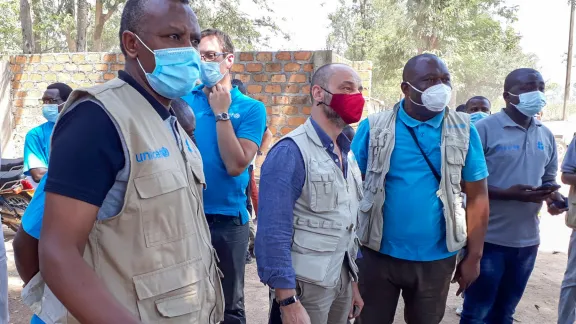
Unicef visit to CAR
LWF and UNICEF pilot a cash nutrition program to empower caregivers
(LWI) - The Lutheran World Federation (LWF) in collaboration with UNICEF and other partners is providing nutrition and healthcare services for children and their caregivers in Bouar, Central African Republic (CAR). The projects use an innovative cash nutrition approach that allows people to prioritize and invest in their own needs.
Armed conflict has affected communities in CAR for decades and caused internal displacement. Much of the infrastructure that would support the health and wellbeing of the population is missing or has collapsed due to prolonged internal conflict. According to the UNICEF situation report a ceasefire announced by the CAR President has decreased the violence in the area. However, the number of people in need of humanitarian assistance is predicted to grow from 2.8 to 3.1 million in 2022.
Since 2018, the LWF has shaped a therapeutic nutrition program to meet the needs in CAR. The program is the only one of its kind and has grown thanks to the foundational support of the Church of Sweden and the Evangelical Lutheran Church of Württemberg. The experience and impact have led to a strong collaboration with UNICEF, the German government, and the Interchurch Organization for Development Cooperation (ICCO).
“Cash programs are important in the context of frequent conflict. Mothers who receive cash say they prefer it because it is more flexible. They can buy nutritious food that is most culturally appropriate and appreciated by the children. The financial support helps feed the whole family and prevents any other children in the family from acute malnutrition. Mothers can use some of the funds to start small business and build their self-reliance for food security,” said Andre Nsengiyumva, LWF CAR Team Leader.
During a recent site visit to Bouar, the Deputy Executive Director for Emergency Programs at UNICEF, Manuel Fontaine, addressed the local community saying, "We only help a bit, but what is important is that you have the courage to come, continue, bring your children and follow through with the small amount of financial support that we hope can give you a push forward.”
Cash programs are important in the context of frequent conflict. Mothers who receive the cash say they prefer it because it is more flexible.
The LWF and UNICEF are currently collaborating on four projects that aim at improving health and nutrition in the region. The integrated nutrition project in Nana Mambéré is building the capacity of 51 health centers to manage severe acute malnutrition. The project trains health centers workers, mothers and community workers called “community relays” and “accompaniers.” The cash-in-nutrition project in the same location has been supporting 500 households with children affected by severe acute malnutrition through a monthly cash allowance. The most vulnerable children receive weekly therapeutic nutrition rations as well. The project in Nana Mambéré is also creating multiple community health sites to ensure local children can receive basic treatment when they are unable to reach formal health centers. Health community workers trained and selected by the project run the sites and would treat malaria, diarrhea and respiratory infection. The fourth project provides integrated health care and treatment of acute severe malnutrition in Bossangoa and Batangafo Health Dstricts for malnourished children under the age of five.
By LWF/T. Rakoto


